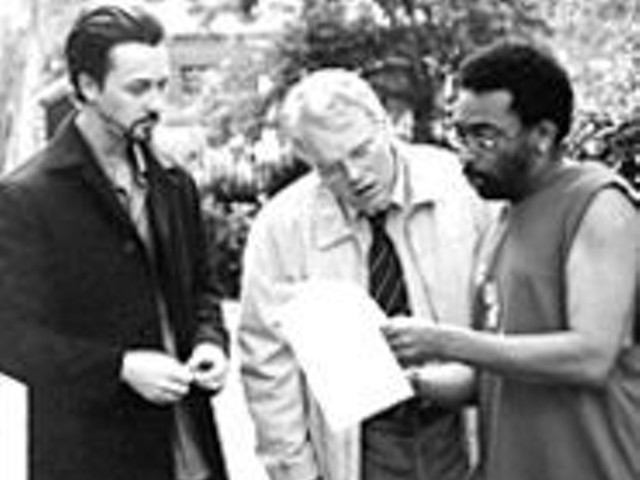In other words, the movie kinda sucks, but damned if Schwarzbaum (or the myriad other critics gushing over Charlie Kaufman's circle jerk ... pardon, experiment in postmodernism) is going to actually say so, because admitting she didn't like it is, to her way of thinking, admitting she just didn't get it -- even though she, ya know, did. Yes, the movie is messy by design, and yes, it is raggedy out of confusion. And when you add one and one, the answer you get is eeewww. Adaptation is like that guy who hands you something rancid and tells you it stinks, then demands that you smell it anyway.
What you're watching isn't a movie, really, but a series of self-admitted "false starts and wrong approaches," in the words of self-loathing Charlie, who, as the movie begins, has been hired by a studio exec (Tilda Swinton) to adapt New Yorker writer Susan Orlean's 1999 The Orchid Thief. The book began as a magazine article about Florida orchid poacher John Laroche and evolved into a book about obsessions, con men, the allure of the "smart" and "sexy" orchid, the history of the Seminoles and the Fakahatchee swamp ... and on and on, to such an extent it's less a narrative than a trip inside Orlean's head and heart (Being Susan Orlean, perhaps?).
Charlie, who despises his soft body and thinning hair and drips sweat like a leaky faucet, can find no way into Orlean's book, which is more a collection of tangents linked by a loose thread. He's been asked to translate something unmalleable, and so he takes the easiest way out of the swamp: Charlie writes about how hard it is to write, certainly a favorite subject among critics intimidated by the blank screen. (In the New York Times, A.O. Scott began his review of Adaptation by writing about how hard it was to write the review of Adaptation: "As the deadline for this review approached, I pictured myself in his agitated state, pacing the floor in a sweat, muttering nonsense into a hand-held tape recorder and then desperately stalling my impatient editors." Did everyone get hit over the head with a meta pipe?)
For the first half, Adaptation gives us two movies: In one, told in flashback, Orlean (Meryl Streep) goes to Florida, meets Laroche (a manic and spindly Chris Cooper, who's missing his top front teeth) and falls under the sway of his intensity and passion. For all his complaints about adapting the impossible, the real-life Kaufman manages to wring from Orlean's sponge of a book a fairly engrossing narrative about ardor and inevitable disappointment. You're left, though, only to wonder what might have been, because Charlie, the real or imagined version, has little interest in anything save his "narcissistic," "self-indulgent" and "pathetic" musings. This is a film that struggles to unravel navel lint. In the other movie, Charlie muddles through his script and life while wannabe Donald (a figment of the real Charlie's imagination) preaches the suffocating tenets of real-life screenwriting teacher Robert McKee (played by Brian Cox); Donald even writes (and sells!) his own hackneyed movie about a serial killer. Charlie, all pose and pretension, loathes Donald's success with writing and women (Donald lands Maggie Gyllenhaal; Charlie makes do with jerking off).
But halfway through the narratives merge: Donald's suddenly reading The Orchid Thief while Charlie's poring through McKee's Story, his revered book on screenwriting, and the movie turns into everything Charlie abhors and Donald adores. Adaptation succumbs, collapses: Charlie promised that his wouldn't be a movie full of car chases and drugs and death and phony insights into the human soul and all that shit, but that's the best Adaptation can offer in the end. It becomes the very thing its creators insist they hate, which isn't meta or ironic or thoughtful at all. It's lazy and solipsistic -- pardon, astounding and provocative. My mistake.





